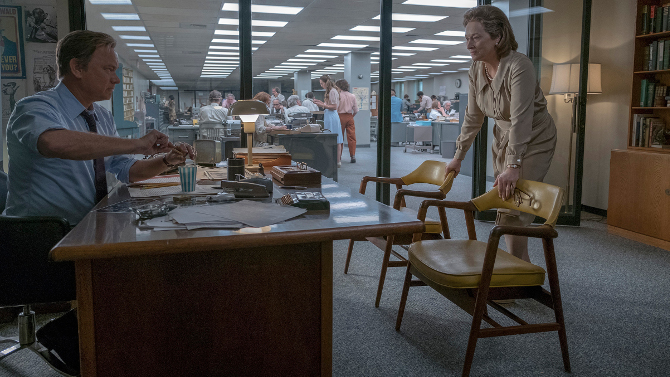If you were formulating a modern day all-star cast and crew, you couldn’t do much better than The Post. Directed by the legend that is Steven Spielberg (three time Oscar winner and seventeen time nominee, as well as the recipient of the Irving G. Thalberg Memorial Award for “Creative producers, whose bodies of work reflect a consistently high quality of motion picture production”), Meryl Streep (three time Oscar winner and twenty-one time nominee), Tom Hanks (two time Oscar winner and five time nominee), composer John Williams (five time Oscar winner and fifty-one time nominee), cinematographer Janusz Kaminski (two time Oscar winner and six time nominee), and co-writer Josh Singer (Oscar winner for 2015’s Spotlight), it is a veritable who’s who of the industry.
Tackling the battle between the Washington Post and Richard Nixon’s government of the 1970s, Streep plays Kay Graham, the somewhat reluctant head of said newspaper. A woman in a man’s world, she has a difficult time transitioning from the non-working socialite wife to decision-making newspaper mogul. Tears always seem like they are soon to come as she clumsily drops things and nervously bumbles her way through this confusing world.
Working with the much more experienced Ben Bradlee (Hanks), he is a veteran newspaper editor with a wild card streak running through his veins. He, in turn, relies upon one of his seasoned writers, Ben Bagdikian (Bob Odenkirk – Breaking Bad; Better Call Saul), to find leads for hard hitting stories.
After the New York Times (the behemoth rival to The Post) publishes leaked documents from the Pentagon detailing clandestine U.S. activities and unflattering admissions regarding the Vietnam War and the inability for them to be the victors, Bradlee is left scrambling to find the papers or the source.
With Bagdikian tracking down the man who leaked the documents, Daniel Ellsberg (Matthew Rhys – The Americans), and bringing the files back to Washington, Bradlee puts the ball in Graham’s court, as her company has just become publically traded on the stock exchange and she fears that the long run family paper will slip away in spite of all of her deceased husband’s and late father’s hard work. With the full force of Nixon’s government ready to crush anyone opposing it (the New York Times has already been silenced with a court injunction), she must make the difficult decision of doing what the press is supposed to do, but by so doing, risking the paper and her legacy.
A based on true events tale that many critics have highlighted mirrors present circumstances, I would suggest that this is a stark reminder that the freedom of the press must be championed and protected at all times, as it is always being challenged in one way or another. Though, The Post also points to the hours and hours of work, as well as the massive amounts of information that needs to be researched in order to do journalism properly (even when a deadline has to be met). . . a rule of thumb that is not always strictly followed in this era of immediate updates and ever important ratings – stories are often launched prior to having a clear picture of things, leading to numerable inaccuracies, at the very least.
Combining film with history, perhaps one of the most intriguing lesser known facts is that the original documents Daniel Ellsberg snuck out and photocopied were used as the papers in the motion picture. . . it also demonstrates the gargantuan amount of files stolen – see the scene where Bradlee and his team are trying to make sense of it all (papers strewn upon nearly every inch of every surface).
Also, it is an excellent example of a story driven by a female lead (something that has also been in the news for the last little while). Streep does a solid job transforming her character over the near two hour picture, blossoming over time, confidence and clarity of vision coming despite her harsh (and very opinionated) surroundings. Through Spielberg’s deft touch (he makes fascinating choices, for instance, we only see Nixon through the window, as if we are ironically spying on his conversations), he designs a solid thriller that is, on top of its ever-present message, a character driven piece. Above and beyond inspired portrayals from Streep, Hanks, Odenkirk and Rhys, other smaller, though important roles, are developed by character actors such as Sarah Paulson, Tracy Letts, Bradley Whitford, Bruce Greenwood, Alison Brie, Carrie Coon, Jesse Plemons, David Cross, and Michael Stuhlbarg.
Pushed forward at a break-neck speed by Spielberg due to its timeliness (from script to final cut, it took only nine months, and it was edited in only two weeks), it has become a contender for Best Picture at this year’s Academy Awards; and is also a prime example of a dependable effort from experienced craftsmen at the top of their game. Noting Williams’ score, it is a unique feat that is perhaps a bit less noticeable than many of his other works, yet it blends into the colour of the print, subtly influencing the viewer as the thriller builds. A final comment for poster lovers. . . keep an eye open near the beginning to see walls lined with one sheets from classic movies, including Planet of the Apes, The Blob, and most importantly, Butch Cassidy and the Sundance Kid (whose star, Robert Redford, and screenwriter, William Goldman, helped bring All the President’s Men to life – the most famous Nixon scandal film). . . these are but a few of the posters. This is no leak, the word is out, and you most definitely won’t have to break in to see The Post this Awards season.

